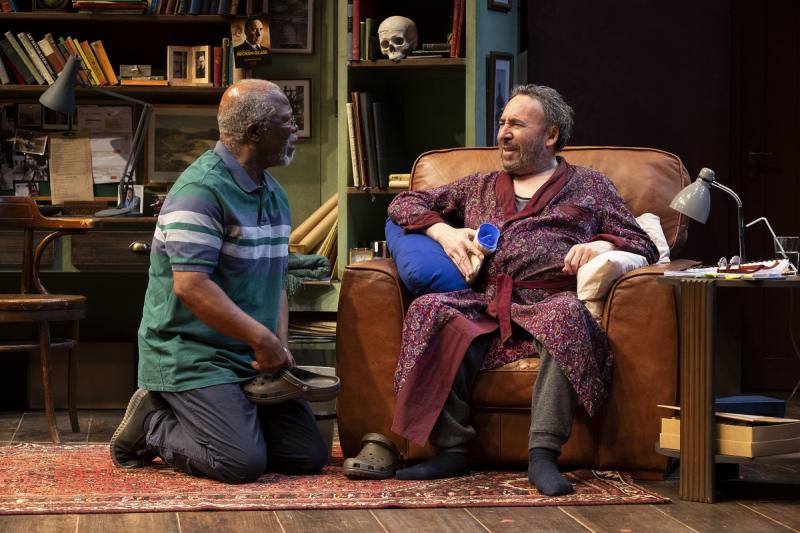Kunene and the King, Ambassadors Theatre review - a Shakespearean voyage through the legacy of apartheid | reviews, news & interviews
Kunene and the King, Ambassadors Theatre review - a Shakespearean voyage through the legacy of apartheid
Kunene and the King, Ambassadors Theatre review - a Shakespearean voyage through the legacy of apartheid
A strange meeting across the boundary of race: John Kani co-stars in his two-hander with Antony Sher

John Kani’s Kunene and the King is history in microcosm.
The playwright stars opposite Antony Sher, both players bringing their own intimate, shared histories to the piece. Kani, in his time the first black actor to play Othello under apartheid, was Caliban to his fellow South African’s Prospero in The Tempest a decade ago, in an RSC production by Janice Honeyman (who directs here). The spirit of Shakespeare presides gloriously over Kunene and the King, the soaring rage and pity of King Lear especially (Sher played that role in 2016). There’s an echo, too, surely of that other Lear-linked drama, Ronald Harwood’s The Dresser, with its comparably uneasy balance of relationship between a furious egotist and the supportive figure who attends on him.
A gasp of pain can freeze Sher's face in blank shock
The attention that Kani’s character, Lunga Kunene, offers to Sher’s Jack Morris is of a more urgent kind, however: he’s an agency nurse who has come to look after his charge through the final stages of liver cancer. There’s friction between them from the start, with Jack taking Kunene for a burglar, a supposed intrusion that immediately brings out the worst in him: he’s a curmudgeonly old cuss, the petulance of age amplified somehow by the changes that his “white man’s world” has undergone. He’s an actor, of some renown if the Hamlet poster is anything to go by, in preparation for a scheduled appearance as Lear, which he believes he can somehow go through with, diagnosis be damned. His lack of pity is corrosive, whether he’s applying it to his own failing body, his nurse-companion, or the new reality that surrounds him.
Kani’s Kunene has immeasurably more poise, one born out of character – he’s absorbed his own disappointments, which have been considerable – as well, surely, from that particular acquiescence enforced on the black population under the apartheid regime. His view on what happened on “his” side of society is jaundiced too, with memories of the Soweto uprising and the circumstances by which his plans to qualify as a doctor were dashed by the actions of his “comrades”. There's rich incidental humour, never more so than when Kani is playing with disputed allegiances of possession – “my culture”, “you people” – that confirm how deep the tribalism across race remains. But then there are nice moments bringing home that these two old men do have things in common aside from their shared sardonic disillusion with the course that South African politics has taken after Mandela (a litany of crooks, in short). Kani’s script is entertaining throughout, even if some elements seem occasionally pat: some of the verbal squabbling is stretched, while Jack’s dipso diversions – he has bottles of gin hidden away all over the place – seem stock elements of an act that Sher can do almost by comic rote. But he varies that lighter register with something deeper: a gasp of pain can freeze his face in blank shock, while when the twists of the third and final act (Kunene runs a little over 90 minutes, no interval) take him into unfamiliar territory, he reveals an unexpected, more attractive side to his character, in which an adjustment of medication plays a role.
Kani’s script is entertaining throughout, even if some elements seem occasionally pat: some of the verbal squabbling is stretched, while Jack’s dipso diversions – he has bottles of gin hidden away all over the place – seem stock elements of an act that Sher can do almost by comic rote. But he varies that lighter register with something deeper: a gasp of pain can freeze his face in blank shock, while when the twists of the third and final act (Kunene runs a little over 90 minutes, no interval) take him into unfamiliar territory, he reveals an unexpected, more attractive side to his character, in which an adjustment of medication plays a role.
What Kani brings to his part is more enduring: his is a quieter voice, with a deeper resonance. Dignity is a key theme of this play, as is empathy, and Kunene has both from the start: for Jack, it’s a steep slope to climb. Kunene and the King moves most in its quieter moments, with Sher’s line at the very end, “Now I see you!”, making clear that he has made the leap of compassion. It’s a “speak what we feel” moment, a profound, unexpected apotheosis.
Kani doesn’t overdo the “enlightenment”, but he certainly brings in some fascinating material, no least the history of performing Shakespeare under the old regime: translations into the native languages were severely restricted, Julius Caesar allowed, in Xhosa, because the authorities believed that the conspirators – read, terrorists – came to a bad end. There’s sheer delight, too, in how Kunene picks apart the plot of Lear: “it’s not an African story”, the king should have married again, and where are the ancestors? For a hint of what such local elements might bring to such drama, the interludes have Anna Mudeka performing a vocal score by Neo Muyanga, its sounds taking us away, perhaps, to some blasted veld. Birrie le Roux’s design makes a neat distinction between the neglect and disorder of Jack’s home – of Sher’s sheer scruffiness, too – and the tidy thrift of Kunene’s Soweto kitchen, its huge old fridge catching time and place as perfectly as a prop can. Janice Honeyman’s direction excels in getting just such details right.
rating
Share this article
The future of Arts Journalism
You can stop theartsdesk.com closing!
We urgently need financing to survive. Our fundraising drive has thus far raised £49,000 but we need to reach £100,000 or we will be forced to close. Please contribute here: https://gofund.me/c3f6033d
And if you can forward this information to anyone who might assist, we’d be grateful.

Subscribe to theartsdesk.com
Thank you for continuing to read our work on theartsdesk.com. For unlimited access to every article in its entirety, including our archive of more than 15,000 pieces, we're asking for £5 per month or £40 per year. We feel it's a very good deal, and hope you do too.
To take a subscription now simply click here.
And if you're looking for that extra gift for a friend or family member, why not treat them to a theartsdesk.com gift subscription?
more Theatre
 Born with Teeth, Wyndham's Theatre review - electric sparring match between Shakespeare and Marlowe
Rival Elizabethan playwrights in an up-to-the-minute encounter
Born with Teeth, Wyndham's Theatre review - electric sparring match between Shakespeare and Marlowe
Rival Elizabethan playwrights in an up-to-the-minute encounter
 Interview, Riverside Studios review - old media vs new in sparky scrap between generations
Robert Sean Leonard and Paten Hughes make worthy sparring partners
Interview, Riverside Studios review - old media vs new in sparky scrap between generations
Robert Sean Leonard and Paten Hughes make worthy sparring partners
 Fat Ham, RSC, Stratford review - it's Hamlet Jim, but not as we know it
An entertaining, positive and contemporary blast!
Fat Ham, RSC, Stratford review - it's Hamlet Jim, but not as we know it
An entertaining, positive and contemporary blast!
 Juniper Blood, Donmar Warehouse review - where ideas and ideals rule the roost
Mike Bartlett’s new state-of-the-agricultural-nation play is beautifully performed
Juniper Blood, Donmar Warehouse review - where ideas and ideals rule the roost
Mike Bartlett’s new state-of-the-agricultural-nation play is beautifully performed
 The Gathered Leaves, Park Theatre review - dated script lifted by nuanced characterisation
The actors skilfully evoke the claustrophobia of family members trying to fake togetherness
The Gathered Leaves, Park Theatre review - dated script lifted by nuanced characterisation
The actors skilfully evoke the claustrophobia of family members trying to fake togetherness
 As You Like It: A Radical Retelling, Edinburgh International Festival 2025 review - breathtakingly audacious, deeply shocking
A cunning ruse leaves audiences facing their own privilege and complicity in Cliff Cardinal's bold theatrical creation
As You Like It: A Radical Retelling, Edinburgh International Festival 2025 review - breathtakingly audacious, deeply shocking
A cunning ruse leaves audiences facing their own privilege and complicity in Cliff Cardinal's bold theatrical creation
 Edinburgh Fringe 2025 reviews: Refuse / Terry's / Sugar
A Ukrainian bin man, an unseen used car dealer and every daddy's dream twink in three contrasting Fringe shows
Edinburgh Fringe 2025 reviews: Refuse / Terry's / Sugar
A Ukrainian bin man, an unseen used car dealer and every daddy's dream twink in three contrasting Fringe shows
 Faustus in Africa!, Edinburgh International Festival 2025 review - deeply flawed
Bringing the Faust legend to comment on colonialism produces bewildering results
Faustus in Africa!, Edinburgh International Festival 2025 review - deeply flawed
Bringing the Faust legend to comment on colonialism produces bewildering results
 Edinburgh Fringe 2025 reviews: Imprints / Courier
A slippery show about memory and a rug-pulling Deliveroo comedy in the latest from the Edinburgh Fringe
Edinburgh Fringe 2025 reviews: Imprints / Courier
A slippery show about memory and a rug-pulling Deliveroo comedy in the latest from the Edinburgh Fringe
 Edinburgh Fringe 2025 reviews: The Ode Islands / Delusions and Grandeur / Shame Show
Experimental digital performance art, classical insights and gay shame in three strong Fringe shows
Edinburgh Fringe 2025 reviews: The Ode Islands / Delusions and Grandeur / Shame Show
Experimental digital performance art, classical insights and gay shame in three strong Fringe shows
 Edinburgh Fringe 2025 reviews: Ordinary Decent Criminal / Insiders
Two dramas on prison life offer contrasting perspectives but a similar sense of compassion
Edinburgh Fringe 2025 reviews: Ordinary Decent Criminal / Insiders
Two dramas on prison life offer contrasting perspectives but a similar sense of compassion
 Edinburgh Fringe 2025 reviews: Kinder / Shunga Alert / Clean Your Plate!
From drag to Japanese erotica via a French cookery show, three of the Fringe's more unusual offerings
Edinburgh Fringe 2025 reviews: Kinder / Shunga Alert / Clean Your Plate!
From drag to Japanese erotica via a French cookery show, three of the Fringe's more unusual offerings

Add comment